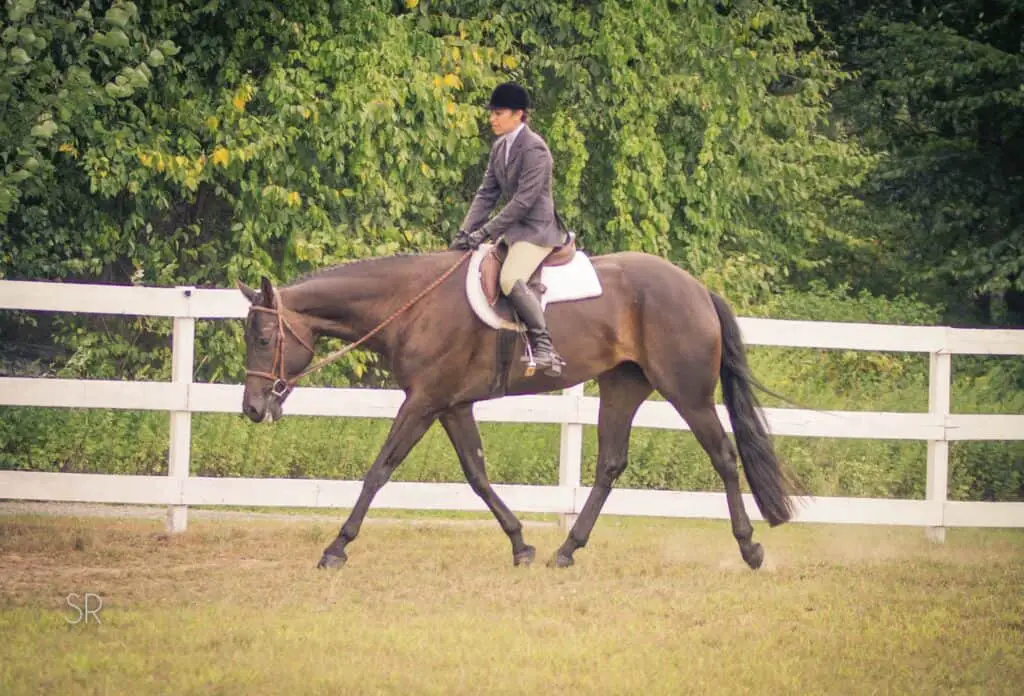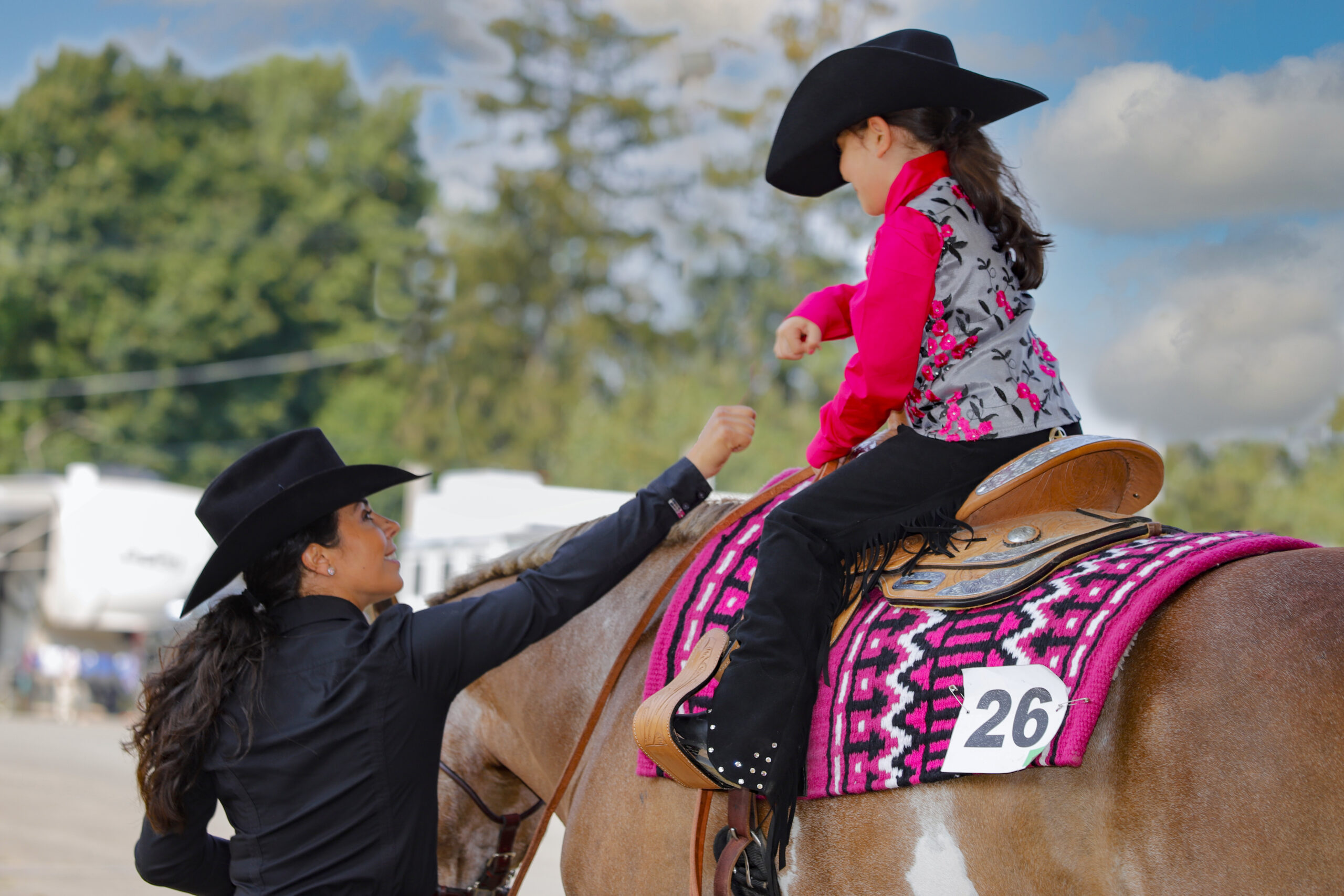So now that you’re into riding horses regularly, you’re probably hearing about horse shows at the barn. Maybe the other students at your barn compete and you’ve noticed the amount of effort that goes into preparing for horse shows. From the pre-show grooming, bathing, packing, planning, travel, and the huge expense that goes along with horse shows. You might even be thinking it’s all glitz and glamour and a little silly. But riding horses is a real sport and just like other sports, adults and kids get a lot out of riding and competing.
If you want to know why so many equestrians can’t get enough of horse showing and competition even though it costs lots of time and money, read on to find out why it’s worth the effort! Below are 7 valuable life lessons that horses and horse showing will teach you!
Horses Create A Serious Work Ethic
You’ve probably heard the popular saying, “no pain, no gain” when it comes to sports. In the equestrian world, it’s no different. Riders are athletes and that means they have to put in the hours of training, conditioning and practice to achieve their goals.
Plus, they have to take care of their partner. While some equestrians may be fortunate enough to have full time grooms to care for their horses, everyone has to pitch in. Even those with a staff will still double check that their horse has everything he needs optimize his performance.
And in the game of riding and competing, there are no quick fixes. So, when an issue arises it takes time and dedication to work through problems or tweak your training. When you’re working with a partner, one of you may not perform as well as the other on a given day. Lots of time developing your partnership and preparing for competition means you and your horse can help each other and rely on each other.
I personally have been in a class where I didn’t ride my best despite trying, and my horse still did his job to the best of his ability. There have also been times my horse wasn’t performing his best but I was able to help him out. This is true for a lot of people, because they put in the work ahead of time.
Humility Is Required
If there is one thing all of us can expect to get whether we asked for it or not as a dose of humility. Horses have a mind of their own and sometimes, no matter how hard we’ve worked or how well we perform, they have other ideas.
Competing horses means paying lots of hefty fees for the judge(s) to give you their opinion. Their opinions while they may be accurate, are still subjective. You may have the best ride of your life, but someone else did better in the judge’s eyes.
Horses and horse shows never go exactly as you expect them to go, all you can do is give it your best shot and hope it works out. Often times that means not placing the way you want but still being happy with how well you and your horse performed. It means being satisfied with personal accomplishments like remembering to ride a certain element a particular way instead of only caring about the ribbons.
Being Detail Oriented Will Set You Apart From Competition
Attention to detail is a crucial skill for any equestrian whether they compete or not. The small details are important in every aspect of horses from riding and grooming, to horse care, competing, learning courses and patterns, stable management and feeding and the list goes on.
Paying attention to the small things can make or break your ride. Noticing small changes in your horse’s behavior or their body could mean anticipating an illness or injury before it escalates to a major problem.
In every facet of the horse world, the details matter greatly. If you’ve been around horses for a little while you’ve probably noticed type A personalities are quite common among horse folk. We’ve been trained at all levels to pay attention.
I can remember being about 8 years old, I was in third grade and went to my riding lesson. I was learning to tack up my own horse for my lessons. So, as instructed, I groomed my horse and tacked up then made my way to the arena. Upon my arrival, my instructor asked me if I had even brushed the horse. She proceeded to point out many areas that needed more attention. As an 8 year old kid, I didn’t know or understand the importance of good grooming and quite frankly was still learning how to use the tools in the grooming kit. Nonetheless, she sent me back to the barn to untack and groom the horse again.
That was pretty impactful and I never forgot it.
The small details can set you apart from other riders in your class too. When you execute an almost perfect ride and everyone else does too, it all boils down to the details.
If you care about the details and want to do your best in the show ring, check out this list of last minute things to check before you enter the show arena!

Team Work & Good Sportsmanship
As I mentioned above, one of the most important life skills you learn as an equestrian is to care about your partner. No rider is working alone, everything we do is with the horse. And, horses aren’t machines. They are living, breathing flight animals with their own thoughts and emotions.
Getting both parties on board and performing their best at the same time is a challenge. But, it’s why we love this sport so much.
The bond many riders share with their horses is more important than any competition, ribbon or title.
You literally cannot win in this sport without the ability to work with your partner successfully. And, there will be disagreements along the way, no doubt. But, hard work and determination (see work ethic above) will lead to trust between you and your horse.
It means learning about each other’s quirks and being aware of each other’s abilities. No rider and no horse is perfect, so you have to learn to capitalize on your strengths and improve your weaknesses to compliment each other.
In addition to becoming a team with your horse, you will also learn to support your farm team. While we compete as individuals in most horse competitions, barn mates help each other and support each other outside the arena. From helping each other tack up and get to the arena on time, moral support, and cheering for each other.
When I was a kid, if I didn’t win a class I hoped it was because someone else in my barn family beat me. Of course, we all want to be first place. But, we know it doesn’t always work out that way. So, you learn to cheer for your friends even when they beat you.
How To Handle Disappointment
The thing about horse shows is, no matter how well you ride in a particular event on a given day, someone else may do it better. Even though your ride may have been a winning ride, the judge(s) may place someone else above you.
The margin for error is pretty slim in most equestrian events too which means it doesn’t take much to lose out on first place. We’re talking split seconds here when it comes to timed events and tiny nuances in other performance classes.
We work hard all year preparing for horse shows and they don’t always go as planned. Disappointment is part of the game but you learn to deal with it and re-focus. Whether it’s disappointment in your own performance, your horse, the scoring of the class, the weather, or a multitude of other factors.
Learning to accept what happens, and then shift your focus back to what is important at the moment is the only way to get through it. Horse shows are filled with lots of highs and lows, and staying level headed can be a challenge.
Becoming Adaptable & Staying Focused
If there’s one thing about showing horses that has always been and will always be true it’s this: Nothing ever goes exactly as planned. You have to expect the unexpected.
Horse shows notoriously run slower or faster than you expect, horses perform better or worse, the weather is not always ideal or changes, your horse may come up lame at the last minute and so on. Horses also tend to behave a little differently at shows than they do at home, minus the special unicorns who are consistent all the time at home and away. People and horses have great days and bad days. Horses get bursts of energy, sometimes they are too tired and the humans tend to run on very little sleep.
Learning to handle changes and pivot in order to keep going is crucial. Horse showing teaches you not to get flustered and just work with what you have. At the end of the day, you have to just keep going. You have to be adaptable and handle the cards you are dealt.
Performing Under Pressure
Ah, the horse show nerves. There’s a saying that goes something like, if you don’t still get butterflies or slightly nervous for your class, then you don’t care.
No matter how much experience you have in the show ring, the feeling of excitement and nerves will never completely go away. If it does, you’re probably not enjoying horse showing anymore.
Horse shows teach you how to work through self doubt, anxiety, fear, nervousness and stay focused on the task at hand and concentrate. You literally have to leave your emotions at the gate when you enter the arena, get the job done and revisit those feelings later if you need to.
Those detail oriented, Type A people I mentioned above tend to also be pretty competitive. Which means they can buckle down and focus without getting distracted.
Performing under pressure is difficult and many people freeze up in tense situations like school or work presentations, public speaking, competitions, etc. This is dangerous when it comes to horses in general. Horses and horse showing can help you learn how to stay calm and perform even with the pressure is on.
I hope you found this article helpful! If you did, please share it on Pinterest and Facebook!

